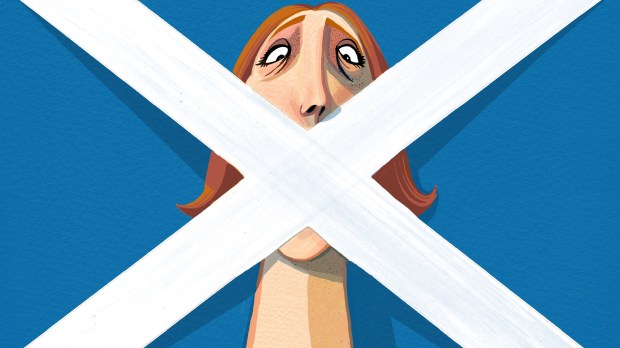The website illicitencounters.com connects married people who are interested in straying, in cheating on their spouses. Or, as the website puts it, people who are ‘looking for a little romance outside their current relationship’. The site now has a million British users.
If you are old-fashioned and simplistic enough to disapprove of this, as undermining of marriage, then one of the company’s recent press releases can help you towards a more sophisticated view. Having polled 200 of its stalwart adulterers, who have been using the site for 11 years, it found that two thirds said that their extramarital adventures had strengthened their marriages. The website also claims that by helping people to stray ‘discreetly’, it makes an affair less likely to be rumbled. In other words, it saves you from seeking risky thrills with the leaky-mouthed village tart, leading to the collapse of your marriage, if it can be called a marriage. One user says: ‘I need to get my kicks from somewhere, having a secret affair is what exhilarates me the most — it’s a high you can’t experience anywhere else in life.’
Illicitencounters.com portrays adultery as sexy and natural — and it’s not alone in this. Suddenly there’s a swarm of sites advertising ‘married dating’ services: affairsclub.com, nostringsattached.com, victoriamilan.com, ashleymaddison.com (slogan: ‘Life is short. Have an affair.’). There’s even a married dating watchdog which adopts a very lofty tone of voice and claims to sort the ‘decent’ adultery sites from the rip-offs. There are films about adultery, a hit TV series (The Affair) and endless magazine features all toying with the idea that married couples can have their wedding cake and eat it.
And can they? Is this all just harmless hanky panky, another step towards liberation? I don’t think so. I think we should consider that all these websites are seriously morally wrong, just as wrong as an organisation that promoted racism.
That might sound excessive. But is it really? If we think that marriage is a morally good thing, then why shouldn’t we defend it as strongly as we defend the principle of equality? Maybe we should see Steven Lines, its founder, and Simon Francis, its CEO, as akin to fraudsters, rabble-rousing bigots or apologists for paedophilia.
On sexual morality, we seem to have two principles. One: any sort of sex between consenting adults is fine, it is one’s right, for sex is the purest realm of individual self-expression. Two: marriage is good. Its stability enables people to flourish, and is provably the best structure within which to raise children. It is an immense contributor to ‘the common good’.
Our culture believes in both principles, but it finds the first principle infinitely easier to affirm than the second. Individual rights are clear and concrete, beside the vaguer matter of a complex tradition that fosters the general good.
In practice, this tradition gets subtly sidelined by the easier appeals to individual rights. Lots of liberal people who consider themselves bravely third-wayish will say, ‘No, this is a false dichotomy: what’s so hard about affirming both principles at once?’ And they will say that gay marriage is a cause that unites the two principles: have not homosexuals nobly demanded the right to participate in this tradition that nurtures the common good? Well, no, not really. Gay marriage is an affirmation of gay rights, not of marriage. Though it speaks of marriage as a social good, its moral energy is all about individual rights. In the past few years I have not heard a gay marriage advocate saying anything thoughtful about marriage. They all say, in effect, ‘Our love is as good and pure as yours and deserves the big teacher’s tick of marriage, how dare you say it doesn’t, how dare you?’
A serious defence of marriage, which would entail an earnest condemnation of the likes of illicitencounters.com, feels preachy. But isn’t all morality preachy? Isn’t it also preachy to say that discriminating against minorities is wrong? It’s just a different sort of preachy, that happens to come more naturally to us these days. Because it’s backed up by the cultural powers of our day, from law lords to cool actors and witty hacks, it doesn’t feel like moralising, it just feels like the assertion of natural justice.
So the problem is not that we have stopped believing in the moral good of marriage. The problem is that we are losing the habit of expressing this belief. That’s a dangerous loss. Our inarticulacy will allow the belief to weaken, to fall into disrepair. This is already happening. Today’s liberal-lefties marry apologetically, as if they are slightly letting the side down. They are embarrassed to be opting in to a tradition that Tories see as morally important. I know, I know, says the sassy feminist columnist: by getting married I am vaguely associating myself with bourgeois moralising, so let me be clear that there is no social-moral significance in my marrying — I just happen to love my fella.
But you can’t remove morality from marriage, or make it a merely personal matter. To marry is to side with a tradition that counteracts the nervy individualism and competitive insecurity of our world, a tradition that plants social virtues in a new generation. ‘To settle down’ is a transitive verb; one is settling the world down a bit, by settling one’s love life; one is countering chaos a bit, enabling space for good culture. And marriage’s power to spread social virtue is rooted in the trust that is established between a sexually faithful couple. To say that an affair can strengthen a marriage is like saying that a pacifist movement can be strengthened by some bombing.
Why does such talk rile the edgy liberal pundit? Because it sounds like the bragging of the privileged. Such liberals cannot deny a strong link between marriage and wellbeing, but they say it’s economic wellbeing that comes first — when that gives you stability, marriage more readily follows. So talk of the morality of marriage is just the lucky classes patting themselves on the back. They have half a point. The moral power of marriage does overlap with bourgeois values. But that does not discredit it. To dismiss the morality of marriage because you don’t want to sound bourgeois is irresponsible. It is to hide something you know to be good under a bushel, so your edgy image stays intact.
Affirming the morality of marriage is awkward. Square though it sounds, it means questioning whether we should be so tolerant of the entertainment industry’s hedonistic view of sex. It’s easy enough to criticise crass reality shows and porn; it’s trickier to admit that quality dramas such as Mad Men are part of the problem (as indeed are most novels about adultery, however highly esteemed as art). But if there is serious moral worth in marriage, then there is serious moral worth in fidelity, and we must say so, however uncool we sound. We must challenge the narrative of sex as pure self-expression, and affirm the narrative of sex as something whose ordering, in marriage, brings order.
Got something to add? Join the discussion and comment below.
Get 10 issues for just $10
Subscribe to The Spectator Australia today for the next 10 magazine issues, plus full online access, for just $10.
You might disagree with half of it, but you’ll enjoy reading all of it. Try your first month for free, then just $2 a week for the remainder of your first year.














Comments
Don't miss out
Join the conversation with other Spectator Australia readers. Subscribe to leave a comment.
SUBSCRIBEAlready a subscriber? Log in